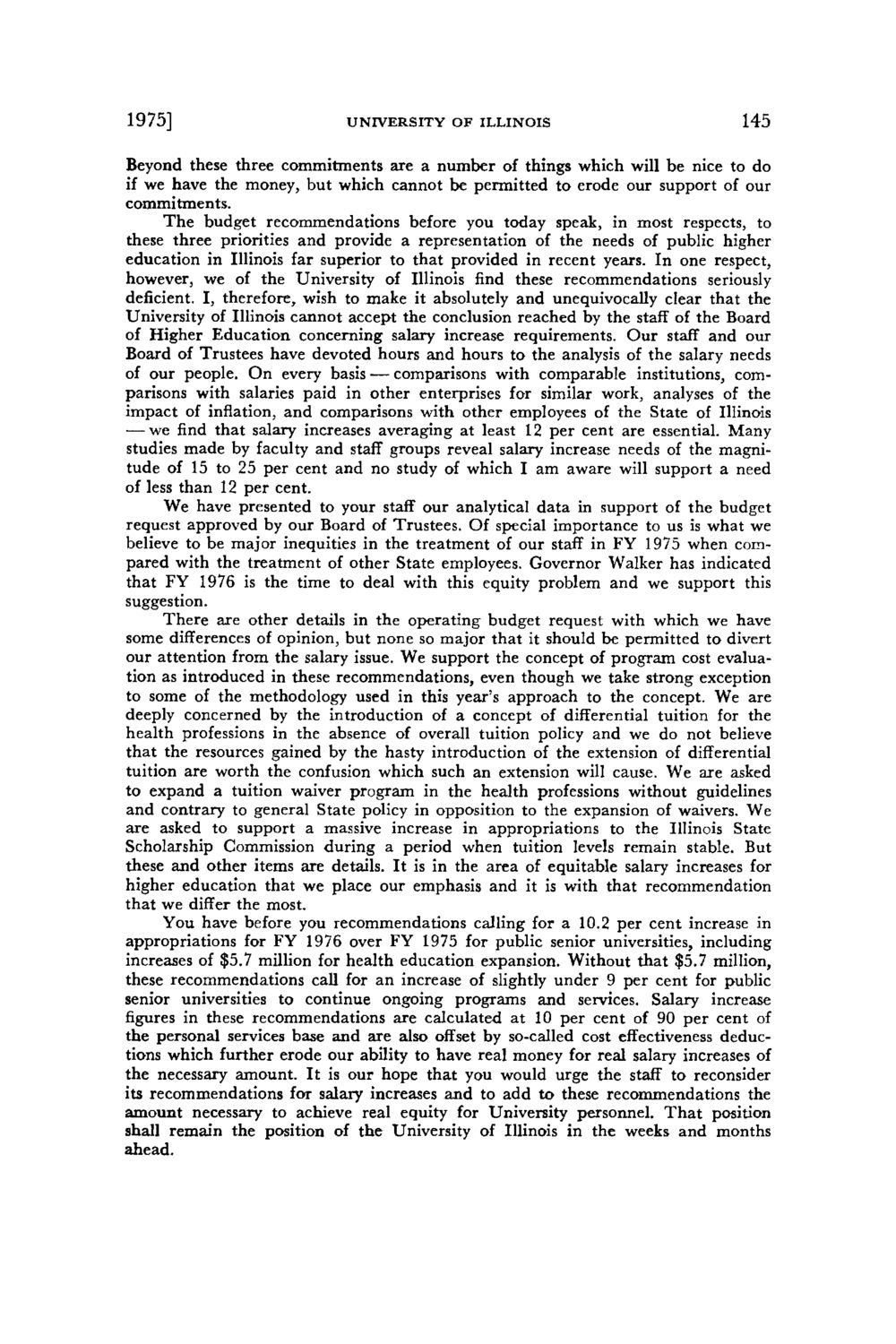| |
| |
Caption: Board of Trustees Minutes - 1976
This is a reduced-resolution page image for fast online browsing.

EXTRACTED TEXT FROM PAGE:
1975] UNIVERSITY OF ILLINOIS 145 Beyond these three commitments are a number of things which will be nice to do if we have the money, but which cannot be permitted to erode our support of our commitments. T h e budget recommendations before you today speak, in most respects, to these three priorities and provide a representation of the needs of public higher education in Illinois far superior to that provided in recent years. In one respect, however, we of the University of Illinois find these recommendations seriously deficient. I, therefore, wish to make it absolutely and unequivocally clear that the University of Illinois cannot accept the conclusion reached by the staff of the Board of Higher Education concerning salary increase requirements. Our staff and our Board of Trustees have devoted hours and hours to the analysis of the salary needs of our people. On every basis — comparisons with comparable institutions, comparisons with salaries paid in other enterprises for similar work, analyses of the impact of inflation, and comparisons with other employees of the State of Illinois — we find that salary increases averaging at least 12 per cent are essential. Many studies made by faculty and staff groups reveal salary increase needs of the magnitude of 15 to 25 per cent and no study of which I am aware will support a need of less than 12 per cent. We have presented to your staff our analytical data in support of the budget request approved by our Board of Trustees. Of special importance to us is what we believe to be major inequities in the treatment of our staff in FY 1975 when compared with the treatment of other State employees. Governor Walker has indicated that FY 1976 is the time to deal with this equity problem and we support this suggestion. There are other details in the operating budget request with which we have some differences of opinion, but none so major that it should be permitted to divert our attention from the salary issue. We support the concept of program cost evaluation as introduced in these recommendations, even though we take strong exception to some of the methodology used in this year's approach to the concept. We are deeply concerned by the introduction of a concept of differential tuition for the health professions in the absence of overall tuition policy and we do not believe that the resources gained by the hasty introduction of the extension of differential tuition are worth the confusion which such an extension will cause. We are asked to expand a tuition waiver program in the health professions without guidelines and contrary to general State policy in opposition to the expansion of waivers. We are asked to support a massive increase in appropriations to the Illinois State Scholarship Commission during a period when tuition levels remain stable. But these and other items are details. It is in the area of equitable salary increases for higher education that we place our emphasis and it is with that recommendation that we differ the most. You have before you recommendations calling for a 10.2 per cent increase in appropriations for FY 1976 over FY 1975 for public senior universities, including increases of $5.7 million for health education expansion. Without that $5.7 million, these recommendations call for an increase of slightly under 9 per cent for public senior universities to continue ongoing programs and services. Salary increase figures in these recommendations are calculated at 10 per cent of 90 per cent of the personal services base and are also offset by so-called cost effectiveness deductions which further erode our ability to have real money for real salary increases of the necessary amount. It is our hope that you would urge the staff to reconsider its recommendations for salary increases and to add to these recommendations the amount necessary to achieve real equity for University personnel. T h a t position shall remain the position of the University of Illinois in the weeks and months ahead.
| |